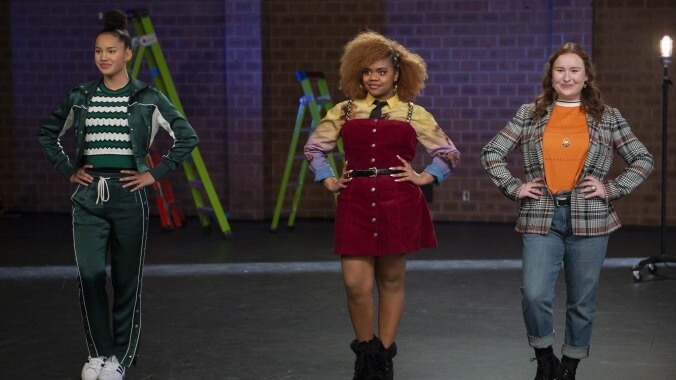Disney Plus’ High School Musical series graduates beyond its source material

From the beginning, Disney+’s musical dramedy High School Musical: The Musical: The Series had a number of obstacles to clear before skeptics would deem it a success—that is, beyond its cumbersome name. First, it had to find a fresh perspective on a wildly popular movie trilogy after a decade-long cooling period. Then, it had to convince old and new fans alike that there was an interesting story beyond the growing pains of Troy Bolton and Gabriella Montez.
To that end, the first season delivered. Show creator Tim Federle found a striking balance between grounded sentiment and buzzy musical theater that made this take a worthy and distinguishable adaptation. Also, the talent emanating from the young cast certainly didn’t hurt matters. In its second season, HSM: TM: TS faces a new challenge: proving that season one’s successful execution wasn’t a fluke. After all, the finale ended with a (mostly) successful teen production of High School Musical: The Musical. Technically, they did the thing. What’s left to accomplish?
Well, a brand new spring musical, for starters. Also, fans likely remain curious about the fates of Nini (Olivia Rodrigo), who earns an opportunity to study theater at a prestigious performing arts school in Denver, and Gina (Sofia Wylie), who faces the possibility of moving away. It was clear last season that the series had more stories to tell, and the first three episodes of season two absolutely provide as much. While early episodes hint toward a couple of missed opportunities to improve upon itself, HSM: TM: TS makes up for it with stronger character development and a viable plan to move the story beyond its origins.
And the best way to achieve said progress is, ironically, to move on from the HSM universe. There’s a brief, harrowing moment when it appears that the spring musical will simply be HSM 2. Thankfully, an impromptu competition between Miss Jenn (Kate Reinders) and her ex-boyfriend-turned-rival-drama-teacher (guest star Derek Hough) prompts a necessary pivot to Beauty And The Beast. The natural assumption amongst the East High thespians is that Nini and newly reinstated boyfriend Ricky (Joshua Bassett) will resume their positions as leads. But when Nini makes the decision to pursue her dream school in Colorado, her departure leaves the stage open for a new star.
It’s not often that a change as substantial as separating a central character from the bulk of the action is considered a good thing, especially when it involves someone with Rodrigo’s theater chops. However, allowing Rodrigo to pursue a storyline separate from the love triangle that dominated the previous season proves to be a necessary shift not only for the characters directly involved in the conflict, but for the supporting cast, as well. Nini’s story evolves beyond her love life to explore the often toxic realities of professional acting; Ricky and departing senior E.J. (Matt Cornett) are granted some room to mature; and Nini’s best friend Kourtney (Dara Reneé) is given a hearty storyline of her own, elevating her beyond her former post as a supportive sidekick. Though mere weeks have passed, narratively, between seasons, the growth shown with every character signals a show that isn’t afraid to mature with its audience.
There are moments, however, that render certain elements a bit stagnant. The introduction of Lily (Olivia Rose Keegan), an eager and decidedly cutthroat actor who is gunning for the role of Belle, is poised to serve as former Mean Girl Gina’s archetypical replacement. The need for an antagonist to cut through the show’s saccharine exterior is understandable—less so is an ostensibly progressive show’s desire to participate in a trope that positions ambitious women as villains, which tends to be a pervasive thing in entertainment that centers on young artists. The second half of season one did an excellent job of pulling back on that tendency by later humanizing Gina. To be fair, there’s a chance that the extremely talented Lily could travel a similar path to redemption in later, yet-to-be-seen episodes. For now, it just rings like an unimaginative misstep in a show that has largely avoided convention, romantic triangle aside.
There’s also the matter of the musical performances, which felt much more organic the first time around. Medleys and grand dance numbers play more to the traditional musical comedy format—that is, splashy and, in spots, a little forced. That doesn’t make the music any less impressive or fun (and hell, this is a musical, after all), but it could have some fans missing the days of heartfelt piano ballads that genuinely worked within the narrative. That said, standout performances by Reneé and Julia Lester’s Ashlyn are treats that should be savored, no matter how they’re packaged.
In fact, the expansion of Lester’s and Reneé’s roles are easily this season’s greatest rewards as, along with Nini, they act as conduits for a larger discussion about archaic theater stereotypes. Those familiar with formal theater education will recognize the age-old and rightful criticism surrounding narrow casting practices—mainly, who is considered a fitting lead versus who is “meant” to serve as a character actor. It’s comforting to see Federle and company take on such a talking point with younger audiences that will hopefully inspire them to push back on such ideology. It’s especially beneficial if it somehow recognizes the star quality in both girls.
HSM: TM: TS’s capable young cast and quick wit remain the show’s greatest strengths. As long as this sharp series continues to establish an identity separate from its source material, it should remain top of its class for seasons to come.